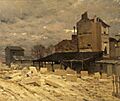Marie Cazin facts for kids
Quick facts for kids
Marie Cazin
|
|
|---|---|
| Born |
Marie Clarisse Marguerite Guillet
September 19, 1844 Paimboeuf, France
|
| Died | March 18, 1924 (aged 79) Equihen, France
|
| Nationality | French |
| Known for | Painting, Sculpture |
| Movement | Impressionism |
| Spouse(s) |
Jean-Charles Cazin
(m. 1868) |
Marie Cazin (born Marie Clarisse Marguerite Guillet on September 19, 1844) was a talented French artist. She was known for her beautiful landscape paintings, decorative art, and sculptures. Marie Cazin passed away on March 18, 1924.
Contents
Early Life and Training
Marie Cazin was born in Paimboeuf, France. She moved to Paris to study art. Her teachers included Juliette Peyrol-Bonheur, who was the sister of the famous animal painter Rosa Bonheur. Marie also studied with Jean-Charles Cazin, another artist. They fell in love and got married in 1868.
Art Exhibitions and Success
Starting in 1876, Marie began showing her paintings at a big art show in Paris called the Salon des Artistes Français. From 1882, she also started showing her sculptures there. Her art was also displayed at the Royal Academy of Arts in London in 1874 and 1878.
One of her most famous sculptures is called "The Young Ladies." It was shown in 1886. The French government bought this sculpture in 1899, and you can still see it today at the Musée du Luxembourg in Paris.
Marie Cazin also exhibited her work with a group of artists called Les XX in Brussels in 1887. She won a gold medal at the Exposition Universelle (1889), a huge world's fair held in Paris in 1889.
Later Career and Legacy
In 1891, Marie Cazin became a member of the Société Nationale des Beaux-Arts, a respected art society. She also showed her art at the World's Columbian Exposition in Chicago, Illinois, in 1893. This was another very large world's fair.
After her husband, Jean-Charles Cazin, passed away, Marie designed a special monument for his tomb. She also created a monument for two doctors, Hubert Cazin and Paul Perrochaud, in the town of Berck.
A common theme in Marie Cazin's paintings was women at work. During World War I, she kept her art studio in Paris. Besides her regular art, she created several large wall paintings called frescoes. She also designed patterns for the Gobelins Manufactory, a famous French tapestry workshop. A few years before she died, she moved to Pas-de-Calais.
Marie's son, Michel Cazin, also became an artist. He was known for his engravings. Marie Cazin's work was featured in a special art show in 2018 called Women in Paris 1850-1900.
Images for kids
See also
 In Spanish: Marie Cazin para niños
In Spanish: Marie Cazin para niños



